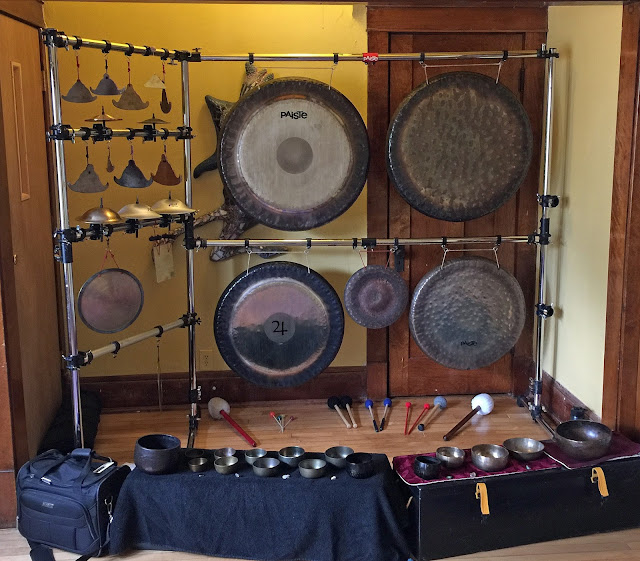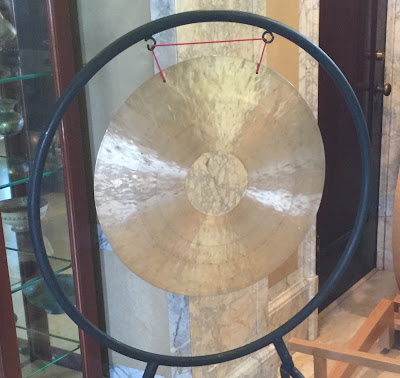From the Mailbag: Are You Counting?
Today's question actually comes from the Q&A time after one of my recent sessions. “Are you counting?” was asked. I found it interesting that someone picked up on this. I didn't have a chance to ask them, but I suspect they were also a musician.
Yes, I count all the time. You can't be a musician/drummer for 50 years and not count! I count both consciously and unconsciously. When I'm not counting consciously, I'm feeling the time. At this stage of my life it's all innate and intuitive. Besides, I'm a counter. I count everything (well, not everything, but a lot of things. And that's a whole other story…).
“But you talk about working in no time,” you say. “What gives with this counting everything?”
Yeah, about that. For me, it works both ways. I count because I don't want what I do to be some sort of random pandemonium, because I've been to enough Gong events that I thought were just random pandemonium and not the least bit relaxing. I even got up and left a few of those.
It Don't Mean A Thing, If It Ain't Got That Pulse
Besides Gong Meditations, I also play a lot of improvised music with other musicians, and again, because I don't want these performances to be just random pandemonium by a group of musicians, I'm always counting or feeling time there too. As much as the music is improvised, I personally feel there needs to be a sense of direction, a rhythmic path for everyone to follow. What I play may not be obvious on the surface, but underneath I'm feeling a pulse, feeling some sort of arc of time. I look at it as driving down the road, not knowing the destination, but staying on the road and looking for signposts when/where I will change the rhythmic flow/direction.
Now there are different ways to play the time. I can make it very obvious, like when I play a beat on a drum set or hand drum. Boom-boom-boom—you can't miss it. But when I'm playing improvised percussion, I like to imply the time and not make it so obvious and in-your-face.
In a meditation session it's the same thing, and I'm always working with a sense of flow. I know the beginning and the ending things, and construct everything along the path from the beginning to the ending. This flow changes: slow, fast, and in between—but there is always a sense of rhythm underlying everything.
Listen To Your Instruments
Part of the rhythms I use come from the instruments themselves. If you pay attention, each Gong/bowl/bell has its own rhythm/pulse. When I strike a Gong, the resulting sound usually has some sort of pulse to it: wah-wah-wah-wah-etc. On bigger Gongs, it's usually slower. On smaller ones, it's faster. The same with the bowls and bells. When I'm playing one instrument for a duration of time, I usually follow the pulse of that instrument. If I'm playing multiple instruments, one of them is usually designated as the time keeper and I follow its pulse.
Certain of my instruments are designated time keepers because they have a very strong, obvious pulse when struck and I like to work with them. When I play melodies on my copper clad bells, the #2 bell is always the time keeper because it has a very strong pulse at the tempo I want to use. So I follow this bell.
Another part of this is listening to the pulse fade before I strike the instrument again. When I play multiple notes on one instrument, I like the duration between strikes to be even.
Above is a stereo audio waveform screenshot of my 26" Grotta Sonora Deep Gong from a recent session of mine. You can easily see the pulse it makes. Notice how these 5 Gong strikes are evenly spaced in time. This happens because I am listening to the Gong and feeling the time as the sound fades out. Also, the 5 notes are all close to the same intensity/volume. This is no accident. This is years of practice and hard work
Yes, I count all the time. You can't be a musician/drummer for 50 years and not count! I count both consciously and unconsciously. When I'm not counting consciously, I'm feeling the time. At this stage of my life it's all innate and intuitive. Besides, I'm a counter. I count everything (well, not everything, but a lot of things. And that's a whole other story…).
Time has come today
“But you talk about working in no time,” you say. “What gives with this counting everything?”
Yeah, about that. For me, it works both ways. I count because I don't want what I do to be some sort of random pandemonium, because I've been to enough Gong events that I thought were just random pandemonium and not the least bit relaxing. I even got up and left a few of those.
It Don't Mean A Thing, If It Ain't Got That Pulse
Besides Gong Meditations, I also play a lot of improvised music with other musicians, and again, because I don't want these performances to be just random pandemonium by a group of musicians, I'm always counting or feeling time there too. As much as the music is improvised, I personally feel there needs to be a sense of direction, a rhythmic path for everyone to follow. What I play may not be obvious on the surface, but underneath I'm feeling a pulse, feeling some sort of arc of time. I look at it as driving down the road, not knowing the destination, but staying on the road and looking for signposts when/where I will change the rhythmic flow/direction.
Now there are different ways to play the time. I can make it very obvious, like when I play a beat on a drum set or hand drum. Boom-boom-boom—you can't miss it. But when I'm playing improvised percussion, I like to imply the time and not make it so obvious and in-your-face.
In a meditation session it's the same thing, and I'm always working with a sense of flow. I know the beginning and the ending things, and construct everything along the path from the beginning to the ending. This flow changes: slow, fast, and in between—but there is always a sense of rhythm underlying everything.
Listen To Your Instruments
Part of the rhythms I use come from the instruments themselves. If you pay attention, each Gong/bowl/bell has its own rhythm/pulse. When I strike a Gong, the resulting sound usually has some sort of pulse to it: wah-wah-wah-wah-etc. On bigger Gongs, it's usually slower. On smaller ones, it's faster. The same with the bowls and bells. When I'm playing one instrument for a duration of time, I usually follow the pulse of that instrument. If I'm playing multiple instruments, one of them is usually designated as the time keeper and I follow its pulse.
Certain of my instruments are designated time keepers because they have a very strong, obvious pulse when struck and I like to work with them. When I play melodies on my copper clad bells, the #2 bell is always the time keeper because it has a very strong pulse at the tempo I want to use. So I follow this bell.
Another part of this is listening to the pulse fade before I strike the instrument again. When I play multiple notes on one instrument, I like the duration between strikes to be even.
Above is a screenshot example of my 32" Paiste Symphonic Gong. Notice how the waveform is very different from the Grotta Sonora Gong. You really need to listen to and learn all of your instruments! How can you effectively play them if you don't understand what they do? Each one of my instruments needs to be played differently. No 2 are alike! So you have to do your homework.
That's it for this week, as I'm out of time…
~ MB
Chop Wood / Carry Water / Play Gongs™/ Keep Time






Comments
Post a Comment